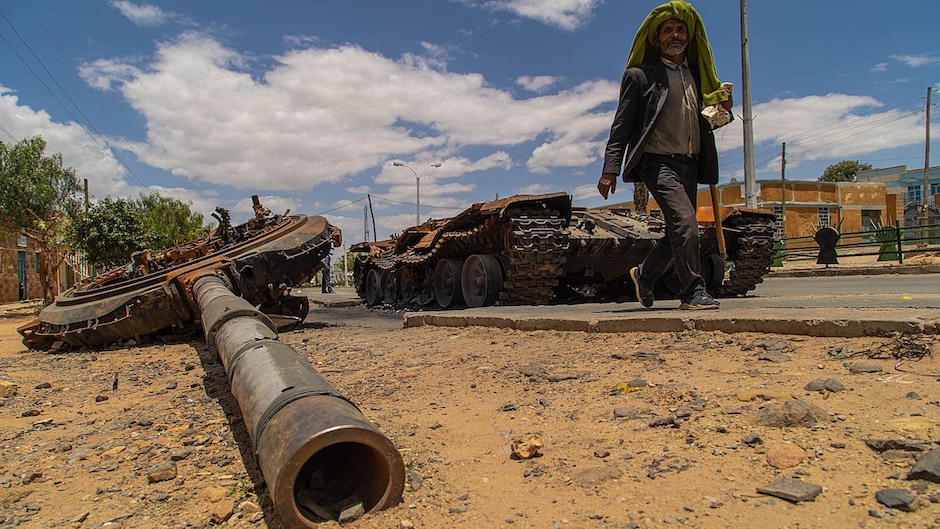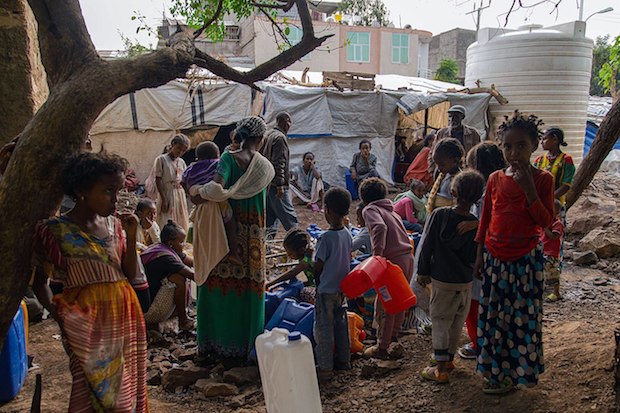Ethiopian evangelicals: “Post-conflict relations will not be easy”
The fight between the government and Tigray's rebels remains unresolved as millions face starvation. “Our hearts weep when we see the recent situation”, evangelicals say.
Protestante Digital · ADDIS ABEBA · 17 NOVEMBER 2021 · 17:30 CET

“Dying for Ethiopia is a duty for all of us”, recently stressed Ethiopian Prime Minister Abiy Ahmed Ali in a statement on social media.
The 2019 Nobel Peace Prize laureate has now declared a state of emergency in the country due to the conflict with rebels in the northern Tigray region, and has encouraged the population to “use any type of weapons to block the destructive advance of the troops, to overturn it and bury it” .
The conflict began in November 2020, when Ali decided to occupy the Tigray region and dissolve the regional governing body, controlled by the Tigray People's Liberation Front (TPLF).
After the federal authorities announced the delay of general elections in June 2020 because of the Covid-19 health crisis, the TPLF, which had excluded itself from the inter-ethnic coalition founded by Ali on the grounds that it reduced regional autonomy, held its own elections in September.
This led to a diplomatic hostility that turned into an armed conflict between Addis Ababa and Mekele (the capital of Tigray). Within a month, the federal government proclaimed victory over the TPLF rebels and set up an interim administration.
However, the announcement was premature. Over the months, the TPLF has regained positions in the Tigray region and has even advanced towards Addis Ababa.
While many media talk of the rebels' likely arrival in the capital, especially after the government's announcement of a state of emergency, the feeling in Ethiopia is different.
A TPLF government “would be a catastrophe”
“The narrative that the rebels are advancing to Addis Ababa is very exaggerated and far from the truth”, Zelalem Abebe, the regional coordinator of the International Fellowship of Evangelical Students (IFES) in English and Portuguese-speaking Africa, based in the Ethiopian capital, told Spanish news website Protestante Digital.
The idea of the TPLF taking control of the federal executive, says Hans Wlahout, a Dutch evangelical missionary currently travelling in the country, “would be a catastrophe” and “would bring chaos to the country and destabilise the whole region” .
"It is important to mention the serious threat of fake news. None of my contacts have confirmed the rebels' advance towards Addis Ababa. So far, it is business as usual in Addis Ababa, although there are reports of arrests of people from Tigray” , underlines the Dutch missionary.
Under a TPLF national government scenario, Walhout stresses, “internal conflicts will only increase, as neither the Amhara nor the Oromo would have a chance” .
A long ethnic conflict
The inter-ethnic power fight in Ethiopia is a key element to understand this conflict. The TPLF has been present in decision-making in Addis Ababa since the overthrow of Mengistu Hailé Mariam in 1991, alongside the Amhara and Oromo. Prime Minister Ali comes from these two ethnic groups.
“This conflict is mostly ethnic, Tigrayans have been in charge for almost two decades, but Prime Minister Ali has marginalised their stake. When he made drastic reforms in the army, he fuelled anti-Tigray sentiment towards the new government and provoked opposition from the TPFL” , explains Walhout.
He recalls that “the TPLF is not Tigray. There are many people in Tigray who just want to live a peaceful life and who are victims of these clashes”.
According to Abebe, “the ethnic issue plays a role in the process”, but it is not the only reason. “The main cause of the conflict is the transfer of power in April 2018 from the TPLF and the reform introduced by the new leader, which made them lose dominancy and created anger and resentment”.

“As a result, the relationship between the TPLF and the federal government broke down. Some religious leaders and traditional elders have tried to bring reconciliation between the sides but failed because the TPLF leadership has rejected mediation efforts. Now, the conflict has become a war and has clearly taken an ethnic turn”, adds the IFES coordinator.
In a comprehensive analysis published in July this year, the Crisis Group platform stated that “unless all parties in Ethiopia make the necessary concessions to bring about a cessation of hostilities (...) thousands more people will die in the midst of conflict and famine”.
“In order for there to be a peaceful solution, there are conditions: First, stop your attacks. Secondly, leave the areas you have entered [Amhara and Afar]. Third, recognise the legitimacy of this government”, pointed out Foreign Ministry spokesman Dina Mufti.
Famine: the deadliest consequence
Not only the stability of the country, on which the Horn of Africa region largely depends, is at stake. One of the most devastating consequences of the conflict is famine.
According to the UN Food and Agriculture Organisation (FAO), 24.8% of the population in Ethiopia has fallen below the food poverty line and is at serious risk of starvation.
Up to 13.4 million people depend on food assistance. Both federal troops and the TPLF have used this as a weapon of war, blocking the arrival of humanitarian aid during the conflict sometimes.
Furthermore, the United Nations Refugee Agency (UNHCR) estimates that 1.2 million people are displaced in Ethiopia as a result of the war.
According to the Associated Press, the military confrontation has resulted in all kinds of atrocities and human rights violations against the people of Tigray by Eritrean soldiers who have supported the federal government. These include sexual abuses, killing of civilians and appropriation of private property.
The Ethiopian Evangelical Council said in a call to prayer posted on social media that they "strongly condemn the abuse against innocent citizens in different places based on religion and ethnic differences and this kind of conflict that has no solution and lasts for a long period of time”
“We would like to express our deepest condolences to the innocent people who have been killed and displaced due to the current situation in our country”, they added.
“Our hearts weep when we see the recent situation of the country”
The conflict has mobilised the church in Ethiopia to pray for peace and the restoration of relations. “There is much prayer for the nation. Many Christians do believe that God will show his power and interfere in a mighty way”, says Walhout.
However, the missionary acknowledges that “our heart weeps when we see the recent situation of the country. We have witnessed the rapid developments in the country over the last ten years and now it seems to be going downhill at the same pace”.
For Walhout “this situation has a devastating effect on the economy. We feel sorry for the tens of millions of people who just want to live their lives in peace and build the nation, but are now victims of a serious threat caused by a minority group”.
Abebe stresses that the situation “is not easy for the evangelical community either. The conflict has destroyed trust amon Christians in the Tigray region and the rest. Extremists on both sides have also framed the difference and broadened the gap. Post-conflict relations will not be easy”
Published in: Evangelical Focus - world - Ethiopian evangelicals: “Post-conflict relations will not be easy”
